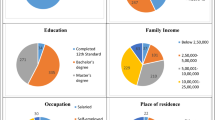Abstract
Credit card companies charge an interchange fee for each transaction, and almost half of this fee is returned to consumers in the form of a reward or perk program. Among credit card users who do not use cards for borrowing (convenience users), rewards are a means to negotiate the implicit price of the interchange fee. Any consumer whose time cost is less than the value of rebates should rationally choose a reward card. Half of convenience users do not own a reward card. We hypothesize that credit card companies segment customers by marketing non-salient credit card characteristics to appeal to naïve consumers while offering lower-price cards (net the rebate) to compete for more sophisticated consumers as suggested in Gabaix and Laibson (2006). Consumer sophistication is measured using a 20-question financial literacy instrument in a large national data set. When household characteristics such as education, income and wealth are controlled in a multivariate analysis, respondents in the highest financial literacy quintile were twice as likely to own a rewards card. The relation between literacy and reward cards provides evidence that credit card rebates resemble other markets where hidden product attributes create a welfare transfer from naïve to sophisticated consumers.
Similar content being viewed by others
References
Ackerman, R., Fries, G. and Windle, R. (2012) Changes in US family finances from 2007 to 2010: Evidence from the survey of consumer finances. Federal Reserve Bulletin.
Allgood, S. and Walstad, W.B. (2011) The Effects of Perceived and Actual Financial Knowledge on Credit Card Behavior. Networks Financial Institute at Indiana State University Working Paper 2011-WP-15.
Ausubel, L. (1991) The failure of competition in the credit card market. The American Economic Review 81 (1): 50–81.
Chase (2012) Advertisement for chase blueprint credit card. Money, January/February: 54–58.
DellaVigna, S. and Malmendier, U. (2004) Contract design and self-control: Theory and evidence. Quarterly Journal of Economics 119 (2): 353–402.
Discover (2012) Advertisement for Discover credit card. Parents, June: 21.
Eliaz, K. and Spiegler, R. (2004) Contracting with Diversely naïve Agents. Working Paper, The Foerder Institute for Economic Research and The Sackler Institute of Economic Studies.
Foster, K., Meijer, E., Schuh, S. and Zabek, M.A. (2011) The 2009 Survey of Consumer Payment Choice. Public Policy Discussion Paper 11-1, Federal Reserve Bank of Boston.
Gabaix, X. and Laibson, D. (2006) Shrouded attributes, consumer myopia, and information suppression in competitive markets. Quarterly Journal of Economics 121 (2): 505–540.
Hayashi, F. (2009) Do U.S. consumers really benefit from payment card rewards? Economic Review 94 (1): 37–63.
Heidhues, P. and Koszegi, B. (2010) Exploiting naivete about self-control in the credit market. American Economic Review 100 (5): 2279–2303.
Huston, S.J. (2010) Measuring financial literacy. Journal of Consumer Affairs 44 (Summer): 296–316.
Huston, S.J. (2012) Financial literacy and the cost of borrowing. International Journal of Consumer Studies 36 (5): 566–572.
Lusardi, A. (2008) Financial Literacy: An Essential Tool for Informed Consumer Choice? Working Paper, National Bureau of Economic Research.
Lusardi, A. and Mitchell, O. (2007) Financial Literacy and Retirement Planning: New Evidence from the Rand American Life Panel.
MasterCard (2012) [Advertisement for MasterCard World Elite Credit Card]. Bloomberg Business Week, June 18: 8.
Simon, J., Smith, K. and West, T. (2010) Price incentives and consumer payment behavior. Journal of Banking and Finance 34 (8): 1759–1772.
Author information
Authors and Affiliations
Corresponding author
Rights and permissions
About this article
Cite this article
Ricaldi, L., Finke, M. & Huston, S. Financial literacy and shrouded credit card rewards. J Financ Serv Mark 18, 177–187 (2013). https://doi.org/10.1057/fsm.2013.11
Received:
Revised:
Published:
Issue Date:
DOI: https://doi.org/10.1057/fsm.2013.11



